Dilpreet Kaur
2026-01-06
7 min read
11 Reliable SEO Services that Drive Scalable Business Growth
Growing a business online requires more than just having a website and hoping people will find it.
Read More
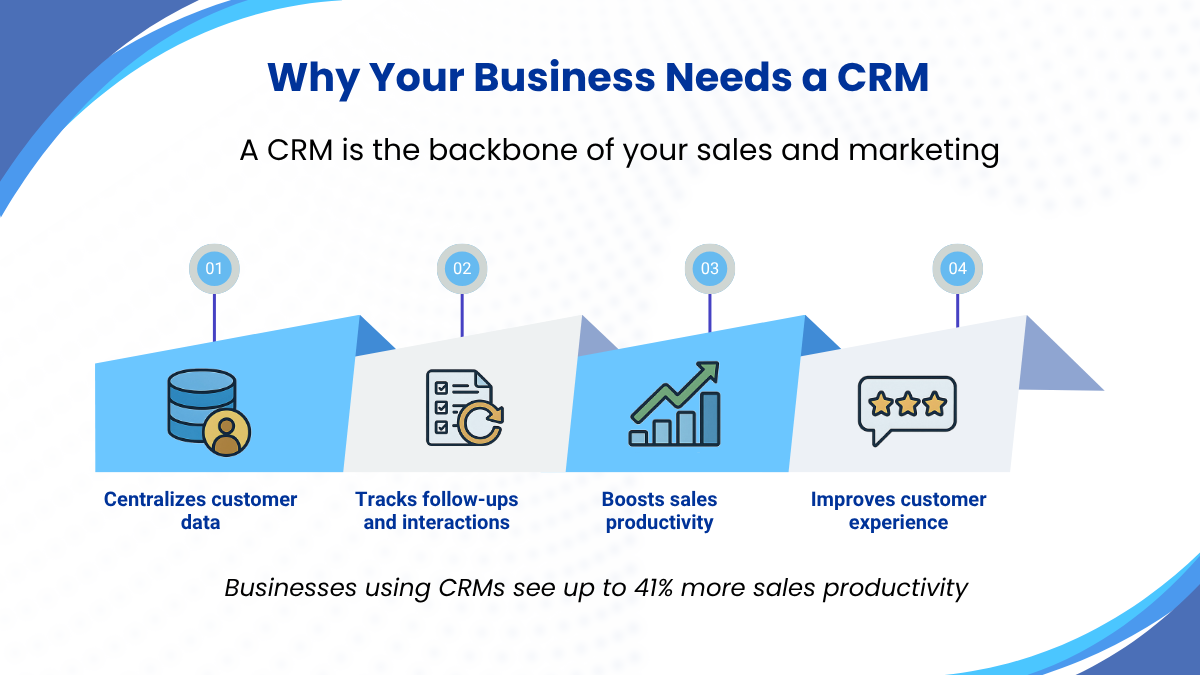
Before diving into the specifics of HubSpot and Salesforce, let’s establish what makes a CRM system essential for modern businesses. A CRM system serves as your central hub for managing customer interactions, tracking sales opportunities, and nurturing relationships throughout the customer journey.
Think of your CRM as the digital backbone of your sales and marketing efforts. It stores contact information, tracks communication history, manages sales pipelines, and provides insights into customer behavior. Without a proper CRM system, businesses often struggle with scattered data, missed follow-ups, and poor customer experiences.
The right CRM system can increase sales productivity by up to 41% per salesperson, according to industry research. It also helps businesses improve customer retention rates and provides valuable analytics for making data-driven decisions. Whether you’re a small startup or an established enterprise, having the right CRM system is crucial for sustainable growth.
HubSpot has built its reputation as an inbound marketing powerhouse that has evolved into a comprehensive CRM solution. Founded in 2006, HubSpot pioneered the inbound marketing methodology and has since expanded to offer a full suite of tools for marketing, sales, customer service, and content management.
What sets HubSpot apart is its philosophy of making powerful tools accessible to businesses of all sizes. The platform was designed with ease of use in mind, making it particularly attractive to small and medium-sized businesses that don’t have dedicated IT teams. HubSpot’s approach focuses on providing everything you need in one integrated platform, eliminating the need for multiple software solutions.
The company has consistently focused on user experience and education, offering extensive free resources, certifications, and training materials. This commitment to customer success has helped HubSpot build a loyal user base and establish itself as a leader in the CRM space. Today, HubSpot serves over 100,000 customers in more than 120 countries, ranging from startups to Fortune 500 companies.
HubSpot’s growth strategy centers around offering a free CRM tier that provides substantial value while introducing users to the platform’s capabilities. This freemium model has been instrumental in HubSpot’s rapid adoption and has made CRM technology accessible to businesses that previously couldn’t afford enterprise-level solutions.
Salesforce revolutionized the CRM industry when it launched in 1999 as one of the first cloud-based CRM solutions. The company pioneered the Software-as-a-Service (SaaS) model and has since become the world’s largest CRM provider, commanding about 20% of the global CRM market share.
Salesforce built its platform with enterprise customers in mind, focusing on scalability, customization, and integration capabilities. The platform’s strength lies in its ability to adapt to virtually any business process or industry requirement. This flexibility has made Salesforce the go-to choice for large organizations with complex sales processes and unique business requirements.
The company’s ecosystem approach has been key to its success. Salesforce’s AppExchange marketplace features thousands of third-party applications and integrations, creating a vast ecosystem of solutions that extend the platform’s functionality. This approach allows businesses to customize their CRM experience extensively while maintaining the core Salesforce infrastructure.
Salesforce serves over 150,000 customers worldwide, including many Fortune 500 companies. The platform’s enterprise focus is evident in its pricing structure, feature set, and the level of customization it offers. While this makes Salesforce incredibly powerful, it also means that smaller businesses might find it overwhelming or unnecessarily complex for their needs.
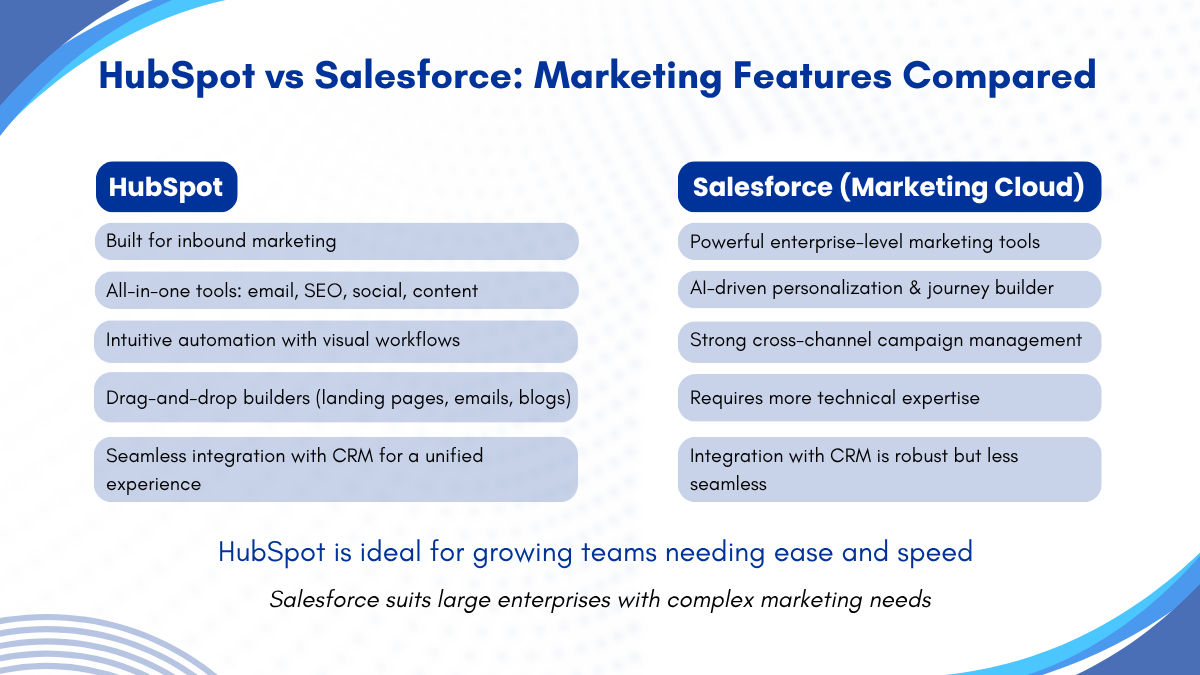
When it comes to marketing features, HubSpot and Salesforce take different approaches to helping businesses attract and nurture prospects. HubSpot was built with inbound marketing at its core, making it naturally strong in this area, while Salesforce has expanded its marketing capabilities through acquisitions and platform development.
HubSpot’s marketing tools are designed to work seamlessly together, creating a unified experience for marketers. The platform includes email marketing, social media management, content creation tools, SEO optimization, and marketing automation. What makes HubSpot particularly appealing is how these tools integrate with each other and with the CRM data, providing a complete view of the customer journey.
The platform’s marketing automation capabilities are intuitive and visual, allowing marketers to create complex workflows without technical expertise. HubSpot’s landing page builder, blog platform, and email designer all use drag-and-drop interfaces that make creating professional marketing materials accessible to non-technical users. The reporting and analytics tools provide clear insights into marketing performance, helping businesses understand which strategies are working and which need improvement.
Salesforce’s marketing capabilities are primarily delivered through Marketing Cloud, a separate platform that integrates with the core CRM system. Marketing Cloud is incredibly powerful and offers advanced features like journey builder, artificial intelligence-powered personalization, and cross-channel campaign management. However, this power comes with increased complexity and typically requires more technical expertise to implement and manage effectively.
The integration between Salesforce CRM and Marketing Cloud, while robust, isn’t as seamless as HubSpot’s unified approach. This can create challenges for smaller teams that need to manage both sales and marketing activities without dedicated specialists for each platform. However, for large organizations with specialized marketing teams, Salesforce’s Marketing Cloud offers capabilities that can support sophisticated, multi-channel marketing strategies.
HubSpot’s sales tools are designed to be intuitive and require minimal training for new users. The sales pipeline is visual and easy to customize, allowing sales teams to track deals through various stages with simple drag-and-drop functionality. The platform automatically captures email interactions, call logs, and meeting notes, providing a complete history of customer interactions without requiring manual data entry.
The sales automation features in HubSpot help streamline repetitive tasks like follow-up emails, task creation, and data updates. Sales representatives can create email sequences, schedule meetings directly from the platform, and receive notifications about important deal activities. The mobile app ensures that sales teams can access and update information while on the go, which is crucial for field sales representatives.
HubSpot’s reporting and analytics provide clear insights into sales performance, including individual rep performance, team metrics, and pipeline health. The forecasting tools help sales managers predict revenue and identify potential issues before they impact results. The platform also includes built-in calling and meeting scheduling tools, reducing the need for additional software./p<>
Salesforce’s sales management capabilities are more robust and customizable, making them suitable for complex sales processes and large sales teams. The platform allows for extensive customization of sales processes, fields, and workflows to match specific business requirements. This flexibility is particularly valuable for businesses with unique sales methodologies or industry-specific needs.
The opportunity management features in Salesforce are comprehensive, allowing for detailed tracking of deal progression, competitor information, and custom fields that capture business-specific data. The platform’s workflow automation capabilities can handle complex business rules and processes, automatically updating records, sending notifications, and triggering actions based on specific criteria.
Salesforce’s reporting and analytics tools are highly sophisticated, offering advanced features like custom report types, dashboard creation, and AI-powered insights through Einstein Analytics. However, creating and maintaining these reports often requires more technical expertise than HubSpot’s simplified reporting interface.
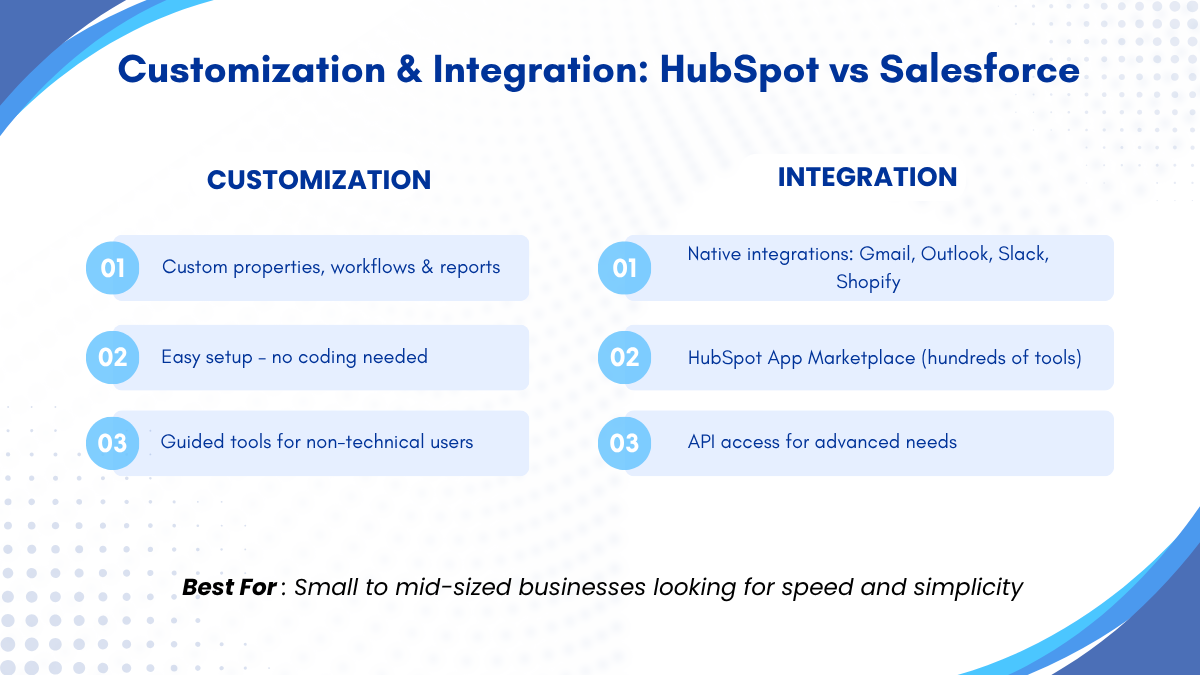
The ability to customize your CRM and integrate it with other business tools is crucial for creating a system that truly fits your business needs. HubSpot and Salesforce take different approaches to customization and integration, each with its own advantages and limitations.
HubSpot offers a good level of customization within its framework, allowing businesses to create custom properties, workflows, and reports. The platform provides templates and guided setups that make customization accessible to non-technical users. However, the customization options are somewhat limited compared to Salesforce, which can be either a benefit or a limitation depending on your business needs.
The integration capabilities of HubSpot are solid, with native integrations for popular business tools like Gmail, Outlook, Slack, and various e-commerce platforms. The HubSpot App Marketplace offers hundreds of integrations, though it’s not as extensive as Salesforce’s ecosystem. For businesses that need specialized integrations, HubSpot provides APIs that allow for custom development, though this typically requires technical expertise.
HubSpot’s approach to customization focuses on providing powerful features within a user-friendly framework. This means that while you might not be able to customize every aspect of the platform, the available options are usually sufficient for most small to medium-sized businesses. The platform’s opinionated design helps ensure that customizations don’t break the user experience or create maintenance issues.
Salesforce’s customization capabilities are virtually limitless, allowing businesses to create completely custom applications within the platform. The platform supports custom objects, fields, workflows, and business processes that can be tailored to match any business requirement. This level of customization is particularly valuable for large organizations with unique processes or industry-specific needs.
The Salesforce AppExchange is the largest marketplace for CRM applications, featuring thousands of third-party solutions that extend the platform’s functionality. This ecosystem approach means that businesses can find specialized solutions for almost any business requirement, from industry-specific applications to advanced analytics tools.
However, this extensive customization capability comes with increased complexity and maintenance requirements. Customizations in Salesforce often require technical expertise to implement and maintain, and poorly designed customizations can impact system performance and user adoption. Many businesses find that they need dedicated Salesforce administrators or Salesforce consulting services to fully leverage the platform’s capabilities.
Understanding the total cost of ownership for each platform is crucial for making an informed decision. Both HubSpot and Salesforce offer multiple pricing tiers, but their approaches to pricing and value delivery are quite different.
HubSpot’s pricing structure is straightforward and transparent, with clearly defined tiers that include specific features and user limits. The platform offers a free tier that provides substantial value, including contact management, deal tracking, and basic reporting for up to 1 million contacts. This free tier is particularly attractive for small businesses and startups that need CRM functionality but have limited budgets.
The paid tiers of HubSpot are priced per seat per month, with costs increasing as you add more advanced features like marketing automation, advanced reporting, and custom workflows. The pricing is predictable and scales with your business needs, making it easier to budget for CRM costs as your team grows.
What makes HubSpot particularly cost-effective is the all-in-one nature of the platform. Businesses often find that they can replace multiple tools with HubSpot, reducing overall software costs. The platform includes marketing, sales, and service tools in most tiers, eliminating the need for separate solutions for each function.
Salesforce’s pricing structure is more complex, with different products and add-ons that can significantly impact the total cost. The base CRM pricing starts at a higher price point than HubSpot, and many advanced features require additional licenses or higher-tier plans. The complexity of Salesforce pricing means that businesses often need to work with Salesforce representatives to understand their total costs.
While Salesforce’s per-user costs might seem higher, the platform’s extensive customization capabilities and enterprise features can provide significant value for larger organizations. The ability to create custom applications and processes within Salesforce can eliminate the need for separate software solutions, potentially reducing overall IT costs.
However, the total cost of ownership for Salesforce often extends beyond licensing fees. Many businesses find that they need to invest in training, consulting services, and ongoing administration to fully leverage the platform’s capabilities. These additional costs should be factored into any pricing comparison.
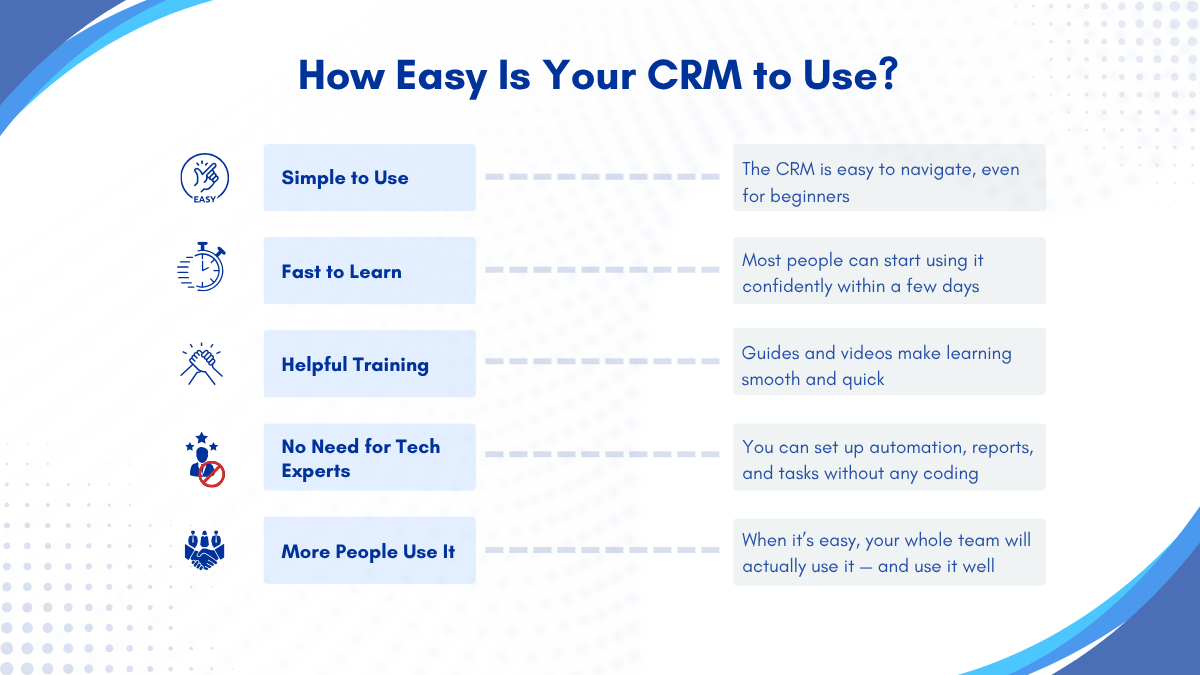
The user experience and learning curve associated with each platform can significantly impact adoption rates and overall success with your CRM implementation. HubSpot and Salesforce have very different approaches to user interface design and ease of use.
HubSpot was designed with ease of use as a primary consideration, making it accessible to users regardless of their technical expertise. The interface is clean, intuitive, and follows modern web design principles that most users will find familiar. The platform uses progressive disclosure, showing users the most important features first and allowing them to access more advanced functionality as needed.
The onboarding process for HubSpot is guided and educational, with step-by-step tutorials and helpful tooltips throughout the platform. New users can typically become productive within days rather than weeks, which is crucial for businesses that need to see results quickly. The platform’s educational resources, including HubSpot Academy, provide comprehensive training that helps users understand not just how to use the tools but why certain strategies are effective.
HubSpot’s approach to complexity is to hide it behind simple interfaces. Advanced features like marketing automation and custom reporting are available, but they’re presented in ways that don’t overwhelm new users. This design philosophy makes HubSpot particularly attractive to businesses that don’t have dedicated technical resources.
Salesforce’s user interface is more complex and feature-rich, reflecting the platform’s enterprise heritage and extensive customization capabilities. While the interface has been modernized over the years, it still requires more training and experience to navigate effectively. New users often need several weeks or months to become fully productive with Salesforce.
The learning curve for Salesforce is steeper, particularly for users who need to understand the platform’s customization capabilities or advanced features. However, this complexity enables more sophisticated use cases and detailed customization that can be valuable for businesses with specific requirements.
Salesforce provides extensive training resources, including Trailhead, its gamified learning platform. While these resources are comprehensive and well-designed, the amount of training required to become proficient with Salesforce is significantly higher than what’s needed for HubSpot.
The quality of customer support and the strength of the user community can significantly impact your success with any CRM platform. Both HubSpot and Salesforce have invested heavily in customer success, but their approaches and resource allocation differ.
HubSpot has built its reputation partly on exceptional customer support and educational resources. The company offers multiple support channels, including phone, email, chat, and an extensive knowledge base. The support team is known for being responsive and helpful, with representatives who understand both the technical aspects of the platform and the business challenges that users face.
HubSpot Academy is one of the most comprehensive free educational resources in the marketing and sales space, offering courses on both platform usage and general business strategy. The certification programs are well-respected in the industry and provide valuable professional development opportunities. The HubSpot community is active and supportive, with users regularly sharing tips, strategies, and best practices.
The company’s commitment to customer success extends beyond just answering questions. HubSpot regularly provides strategic guidance and best practices, helping customers not just use the platform but achieve their business goals. This approach has resulted in high customer satisfaction rates and strong customer loyalty.
Salesforce offers comprehensive support options, including phone support, online case management, and an extensive knowledge base. However, the level of support often depends on the tier of service you purchase, with premium support options available for additional fees. The complexity of the Salesforce platform means that support interactions can sometimes be more technical and time-consuming.
The Salesforce Trailblazer Community is one of the largest and most active software communities, with hundreds of thousands of members sharing knowledge and best practices. The community includes user groups, online forums, and regular events that provide valuable networking and learning opportunities.
Salesforce’s partner ecosystem is extensive, with thousands of certified consultants and implementation partners available to help businesses get the most from their Salesforce investment. While this provides access to specialized expertise, it also means that businesses often need to invest in external resources to fully leverage the platform.
Different industries have unique requirements that can influence which CRM platform is more suitable. Understanding how HubSpot and Salesforce serve various industry needs can help you make a more informed decision based on your specific business context.
HubSpot’s strength lies in its effectiveness for businesses that rely heavily on inbound marketing and content-driven sales processes. The platform is particularly well-suited for technology companies, professional services firms, e-commerce businesses, and companies with relatively straightforward sales cycles. The integrated marketing and sales tools make it easy to track prospects from initial awareness through purchase and beyond.
For businesses in creative industries, agencies, and consulting firms, HubSpot’s project management capabilities and client communication tools provide additional value. The platform’s reporting and analytics help these businesses demonstrate ROI to clients and optimize their marketing strategies.
E-commerce businesses benefit from HubSpot’s e-commerce integrations and automated marketing capabilities. The platform can track customer behavior across multiple touchpoints and create personalized marketing campaigns that drive repeat purchases and customer loyalty.
Salesforce’s enterprise focus and extensive customization capabilities make it ideal for industries with complex sales processes, regulatory requirements, or unique business models. Financial services, healthcare, manufacturing, and large retail organizations often find that Salesforce’s flexibility and scalability better meet their needs.
The platform’s ability to handle complex approval processes, compliance requirements, and detailed audit trails makes it valuable for highly regulated industries. Salesforce’s security features and compliance certifications also make it suitable for businesses that handle sensitive data or operate in regulated environments.
For businesses with long sales cycles, multiple stakeholders, and complex product configurations, Salesforce’s advanced opportunity management and customization capabilities provide the flexibility needed to track and manage these sophisticated sales processes effectively.

Based on extensive experience working with both platforms, several key factors should guide your decision between HubSpot and Salesforce. These recommendations come from analyzing hundreds of implementations and understanding what drives success with each platform.
For small to medium-sized businesses that prioritize ease of use and quick implementation, HubSpot typically provides better value and faster time to results. The platform’s all-in-one approach eliminates the complexity of managing multiple software solutions, and the intuitive interface ensures high user adoption rates. Businesses that need HubSpot services or are looking for an expert HubSpot solutions partner will find a robust ecosystem of certified professionals who can help maximize the platform’s value.
Companies considering HubSpot CRM development or HubSpot CRM migration services should evaluate their current processes and ensure they align with HubSpot’s opinionated approach to sales and marketing. While the platform is flexible, businesses with highly unique processes might find limitations that require process adjustments.
For HubSpot CRM automation and HubSpot CRM workflows, the platform excels at creating sophisticated automated processes without requiring technical expertise. The visual workflow builder makes it easy to create complex automation sequences that can significantly improve efficiency and customer experience.
Large enterprises with complex requirements, substantial IT resources, and unique business processes typically benefit more from Salesforce’s extensive customization capabilities. Organizations that need Salesforce consulting services should budget for both the initial implementation and ongoing optimization, as the platform’s complexity requires ongoing attention to maximize value.
The top Salesforce consulting companies consistently emphasize the importance of proper planning and change management when implementing Salesforce. The platform’s power comes with responsibility for proper configuration and user training, and businesses that underestimate these requirements often struggle with adoption and ROI.
Choosing between HubSpot and Salesforce ultimately depends on your specific business needs, resources, and growth plans. Consider your team’s technical expertise, the complexity of your sales processes, your budget for both licensing and implementation, and your timeline for seeing results.
If you’re a growing business that needs to get a CRM system up and running quickly, values ease of use, and wants an all-in-one solution, HubSpot is likely the better choice. The platform’s strength in inbound marketing and user-friendly design makes it ideal for businesses that want to focus on growth rather than system administration.
If you’re a large organization with complex business processes, have dedicated IT resources, and need extensive customization capabilities, Salesforce provides the flexibility and scalability you need. The platform’s enterprise features and extensive ecosystem make it suitable for businesses with sophisticated requirements.
Remember that both platforms offer trial periods and free tiers that allow you to test their capabilities before committing. Take advantage of these opportunities to see how each platform works with your specific business processes and team workflows.
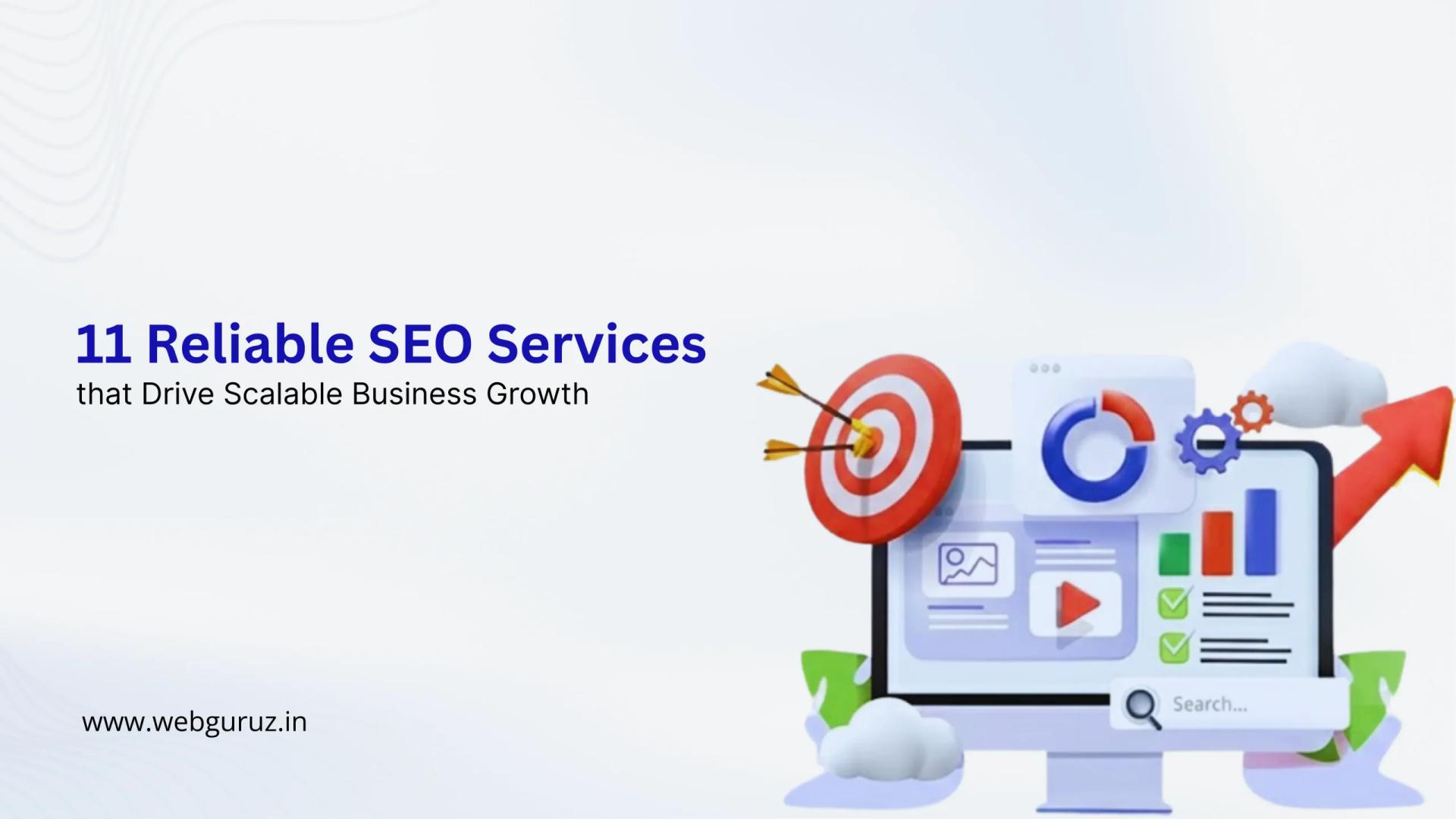
Dilpreet Kaur
2026-01-06
7 min read
Growing a business online requires more than just having a website and hoping people will find it.
Read More
Dilpreet Kaur
2026-01-02
7 min read
Revenue Operations, or RevOps, has become the backbone of how successful businesses operate today.
Read More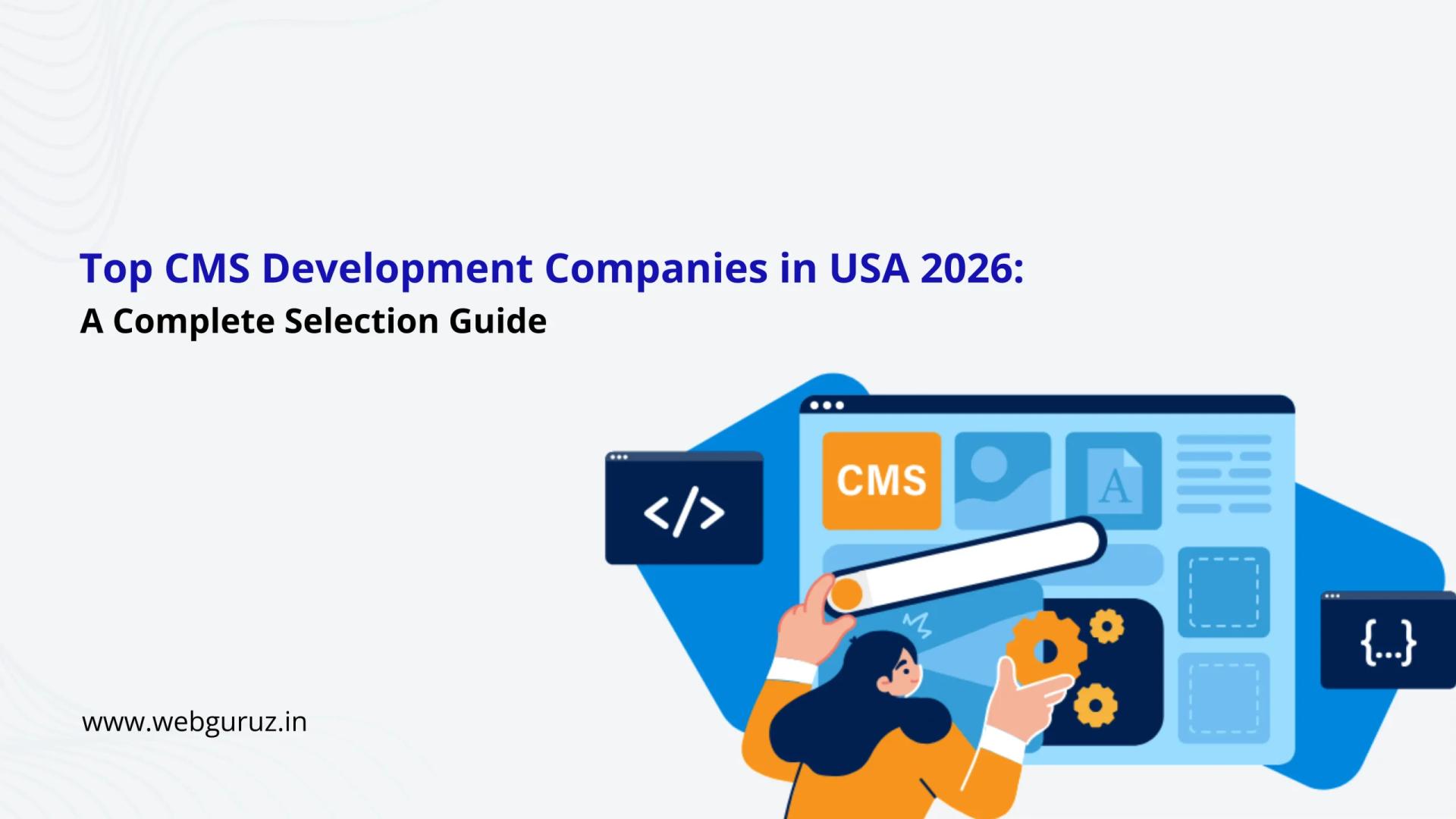
Dilpreet Kaur
2026-01-02
7 min read
Finding the right partner for your website isn’t like ordering pizza.
Read More